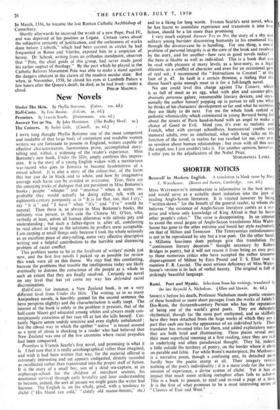SHORTER NOTICES
MISS WATERHOUSE'S introduction is informative in the best sense, and would serve as a suitable short initiation into the joys of reading Anglo-Saxon literature. It is vitiated however by being " written-down " for the benefit of the general reader, to whom she believes " the existence of Anglo-Saxon literature comes as a sur- prise and whose only knowledge of King Alfred is that he burnt other people's cakes." The verse is disappointing. In an attempt to avoid the usual jargon of Anglo-Saxon translations Miss Water- house has gone to the other extreme and based her style exclusively on that of Milton and Tennyson The Tennysonian melodiousness is not to be reproduced by any but a true poet. On the other hand, a Miltonic heaviness does perhaps give this translation the " continuous literary decorum " thought necessary by Robert Bridges in poetry, but it will not rescue it from being an easy prey to those numerous critics who have accepted the rather tiresome disparagement of Milton by Ezra Pound and T. S. Eliot (not to mention F. R. Leavis). -The most serious deficiency of Miss Water- house's version is its lack of verbal beauty. The original is full of strikingly beautiful language.






































 Previous page
Previous page